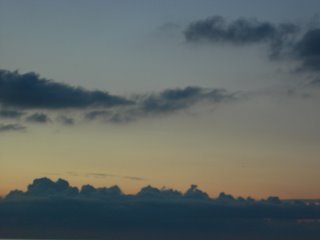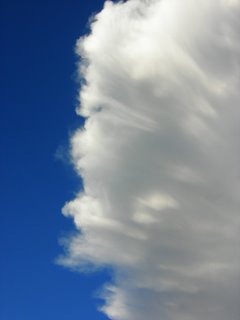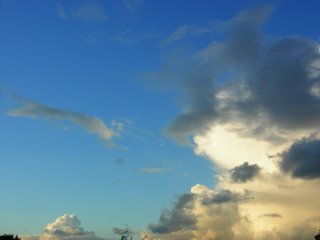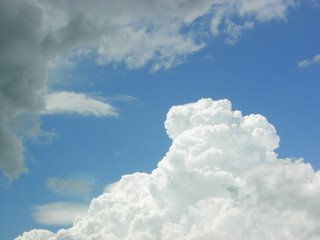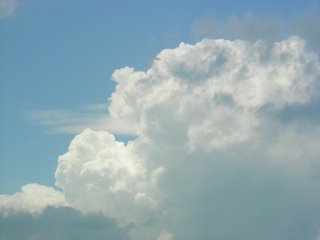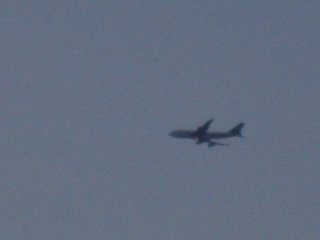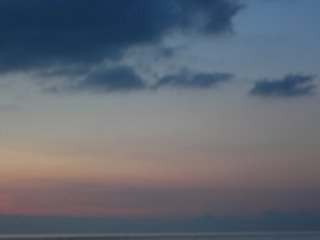
“[…] Stay the course, bring them to justice, we will prevail, as the president says.
With this world strategy, the American government has piled failure upon failure, and seen its credibility evaporate. Nonetheless, Bush, his direct surrounding and a big group of neo-conservative thinkers hold fast to this. That is at the moment one of the greatest risks for the West.
And in order to prevent every kind of misunderstanding: nobody here thinks about the sacrifice of Israel. But the fact that has been consistently bypassed is that all problems begin with the relationship of this nation with the Palestine. If there is already a new Sarajevo in the making, such as [Richard] Holbrooke says, then that would now be called Ramallah.”
--
>>‘Stelling: Hysterische tijden vragen om nuchterheid’ [Statement: Hysterical times demand soberness], Forum, p17, 26 August 2006, De Volkskrant
Nausicaa Marbe:
“Nowadays we all have fear of flying. Also in the train, on the boat, in the metro and on the bus, in the cinema and restaurant. Rightly so. The world is sown with imbeciles who want to kill out of religious nonsense and hatred. The world has too many naïve people who, under the cover of soberness, deny this fact. The threat of terror is permanent and the knowledge that the terrorist is always a step ahead does not make the danger less real. The power of terrorism rests on creativity and the ability to adapt. The only adequate solution to this is to surpass this.”
Oscar van den Boogaard:
“September 11 was the turning point. While we saw images of planes which flew into the WTC, we understood that the air of lightness has ended. War was not something far away, but among us. It could raise its head at every moment and everywhere. However innocent and lovable we think of ourselves, we had enemyies and those enemies live in our midst. Our eyes opened. We were forced to realism.
From now on we can no longer permit [ourselves] to be naïve or thoughtless. The world is too dangerous. We are more than ever aware of our own vulnerability and that of others. Of what binds us all. Life itself. […]
We must listen, reflect, talk, pay attention, be indignant, firm, active, political, careful, brave, patient, and not let ourselves be led by fears, or our egos, but by our wisdom and love.”
>>‘Commentar: Terroristen of lastposten’ [Editorial: Terrorists or Troublemakers], Forum, p17, 26 August 2006, De Volkskrant
On the 12 Indians who were arrested for looking ‘suspicious’ aboard a Northwest Airlines plane which turned back to Schiphol Airport (AMS) shortly after taking off.
“The more false alarm is set off, the more terrorists get their way without having to do anything. […] There exists a climate of fear and suspicion very easily that will undoubtedly lead to even more false alarms. […] Whoever would rather take certainty for uncertainty is not yet discharged from the duty to make a real estimation of the danger.
In recent times numerous incidents in airplanes have presented themselves, in which suspicion of terrorist activities rested primarily on the appearance of the passengers. [If] they look ‘like Muslims’, and behave ‘supiciously’, then alarm is all too quickly sounded. This alertness does not necessarily contribute to a greater [sense of] security, [but does contribute to] a stigmatisation of all travellers with a dark appearance.”
- To forget, and not let our emotions get in the way, like Chinese Daoist masters have taught thousands of years ago is ‘the Way’ to stop, or at least be unaffected by the escalating violence and the chaos of modernity.
Karen Armstrong, ‘The power of forgetting’, 19 August 2006, The Guardian
“[…] poets and artists have always known how to hold themselves in an attitude of silent waiting. Keats called the creative process "negative capability ... when a man is capable of being in uncertainties, mysteries, doubts, without any irritable reaching after fact and reason". Wordsworth understood that the poet needs "wise passiveness" and "a heart that watches and receives". When our minds are stuffed with current ideas, we cannot be truly creative because there is no room for anything new. Creation is ex nihilo: out of nothing, the "wild and empty waste" described at the beginning of Genesis.
“People who have no religious beliefs are often willing to talk to contemplative nuns, because these women, who have embraced silence and emptiness, know how to listen. Listening is rare in our chattering society. It is often all too clear that, while their interlocutor is speaking, participants in talk-shows and phone-ins are not really listening, but thinking up the next clever thing that they want to say. I am certainly guilty of this myself. If we are to break the deadly cycle of escalating violence - of strike and counter-strike, atrocity and enraged reaction - we must listen intently to what everybody, even our enemy, is saying, and be sincerely ready to let it change us: to get beyond the rhetoric, decode the imagery, and hear the subtext of rage, grief, fear, pain, hatred and despair.”
- Opinions on the state of Israel and the Palestinian people from two Dutch-Israeli doctors who have worked in Israel for many decades
Annelien:
On checkpoints:
“[For soldiers at the checkpoints] it is sometimes dangerous, of course. But you do not need to treat the Palestinians like dogs, to snarl and to growl.”
On long ques at the checkpoints:
“We have a [festive] holiday or elections and therefore we just lock the Palestinians up [in their villages]. For our security. If I see the ques, I do think of photos of German camps, but as leftist activist you cannot make such comparison. If you are rightist you can, just think of the colonists who called the soldiers at the evacuation of Gaza last year.”
“You cannot oppress three million people in this way. Internally as well as externally that can lead to the destruction of the state. As long as we continue to oppress the Palestinians, the war, the attacks and the Qassam rockets remain. And in the meantime we go downhill morally, we undermine our values.”
Eldad:
“[Israel] is in shambles. We have already gone along the wrong way for a long time. We lean too much on violence. There is no dialogue. The settlement politics of one government after another is lunacy. Israel has become a very malicious country. It has certainly not become what we had hoped for forty-four years ago. Many people believe that, there are only not many who says that out-loud. It takes [time] before achieve [that] insight.
Everyone knows that a two-state solution must come. I compared it once with a strike. [from a strike] you know that it rests on a compromise, though for four weeks [everything will be a mess]. Maybe there must first be many more deaths before we reach our senses. There must first be […] pain and apparently the pain is not bad enough, but the two-state solution will come. Whether I will experience it? Peace with Egypt and Jordan I had not foreseen after the Six Day War. […]”
- Yoel Marcus, ‘A far cry from Ben-Gurion’, 19 August 2006, The Guardian
Criticism of the war was strong, even within Israel. And the Olmert administration bears the brunt of the blame.
“Much has been said and written about the wisdom of launching a full-scale war instead of making do with a retaliatory operation after the kidnapping of two soldiers; about the first Israeli government to allow its citizens to be bombarded by 4,000 missiles from a terrorist organisation; about a million Israeli refugees making a beeline from north to south; about the tremendous loss of life and property. Who would have imagined, with all our military might, that we would not be victorious in a war where Israel was Goliath and Hizbullah was David?
Blindly, without thinking, Israel volunteered to leap for the second time into the Lebanese bog. With an army of reserve soldiers sitting there until the multinational force arrives, it's only a matter of time before Hizbullah creeps out of its lair and batters us with roadside bombs and suicide bombers.
[…]Rather than look before you leap, the Olmert administration was guided by the opposite principle: leap before you look. The bombastic threats against the enemy, the promises of a new Middle East, the talk about disarming Hizbullah and ending the rocket fire - it was more a shot in the dark than a premeditated plan.”
- Roots of terror, at the grass roots
Of the many actual and foiled terrorist attacks, the people involved are surprisingly young, middle-class, well educated Muslims who have lived or been raised in the ‘west’. Does this say anything about the acceptance of ‘western’ societies of Muslims?
“there is undoubtedly an antagonistic attitude towards British society among some Muslims, particuarl the younger generation. They are througouly westernised, yet anti-Western […]
But what shapes [their] wider grievance-obsessed attitude? Some blame British or US foreign policy. Others claim it is all about Islam. But that cannot explain why young people appear more zealous than parents who came from traditional Muslim countries.
I think the big factor comes from closer to home—the multicultural identity politics that is institutionalised from the top down. The distinctive identiy promoted by multiculturalism is that of the victim. Each identiy group vies to win prestige and grants by parading its suffering. Thus Muslim community leaders elevate any perceived slight into evidence of a wave of Islamphobia, and depict foreign policy as proof of persecution.”
Certainly the more you are made to feel like victims, coupled with diminishing, or at least lower, prospects of prosperity and ascension of the social ladder compared to your (white) peers, the more these youths are going to feel frustrated and hemmed in. the result is striking out, venting frustrations in a desperate cry for help…or at least attention.
“This sort of victim identify feeds the emotions of pity and outrage rather than any political understanding. And it can lead some to lash out like sullen adolescents.”[3]
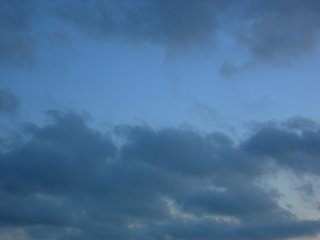
Shocking revelations that, in the UK, though I suspect elsewhere as well, in this day and age a large minority still reject evolution theory in favour of creationism.
“Twelve per cent believe God made the world in the past 10,000 years and put man in it. Another 19% believe God's hand can be seen in all living things, whose existence is otherwise beyond our comprehension. Only 56% put their money wholesale on the theory of evolution. And the reason this is terrifying is that the beliefs of this 31% are rooted in extremes of religion that teach metaphor as fact, and we know where that takes us.”
It’s not so much what they believe in that is the matter, but what the consequences are of the basis of their beliefs, which in turn affect the way many are brought up in their perceptions of and dealings with the world:
“But the worry is that students who buy into creationism aren't prepared to test the evidence against it, and minds closed to the truth have been dangerous since the year dot.
The prime minister put his finger on it a couple of weeks ago in his alarming speech to the News Corp executives in Florida, on the current political state of the world, as viewed by him. The real divisions, he said, were no longer between left and right, but between advocates of modern, open societies and closed, traditional ones - and they are, even if they aren't the only ones.” [emphasis mine]
A campaign by ‘Sex voor Dieren’ [Sex for Animals] last week is collecting signatures to initiate a citizen legislative proposal to make it a right for animals to have sex.
Campaigners argue that millions of animals die yearly in the Netherlands without having had the chance to develop themselves sexually. Some die as virgins. They suggest maybe people can start organising ‘speed dating’ for their pets, or even a ‘peepshow’ for couples, or perhaps start apologising to cows in the field.
“Animals work hard for us people.
They deliver, among other things, milk, eggs, meat, wool, and pleasant company. Therefore animals have the right to good working conditions and pleasure in life. It is up to us to provide for their primary needs of living, such as fun, good food, fun work throughout the week, and now and then healthy love making.
Sex for Animals strives for the animal rights mentioned below:
- The right to sex
- The right to reproduction
- The right to choose partner freely
- The right to family life
These primary animal rights are unfortunately under pressure, because artificial forms of reproduction are more profitable. In order to allow animals to taste love, special effort is necessary.”
Hmmm, I feel guilty now about my little kitty…
H.J.A. Hofland, ‘De Derde Wereldoorlog’ [The Third World War], Opnion, 7 16 August 2006
Mick Hume, ‘Latest drama from the War on Terror: er, all quiet on the Walthamstan front’, Comment, p19, 18 August 2006, The Times [of London]
